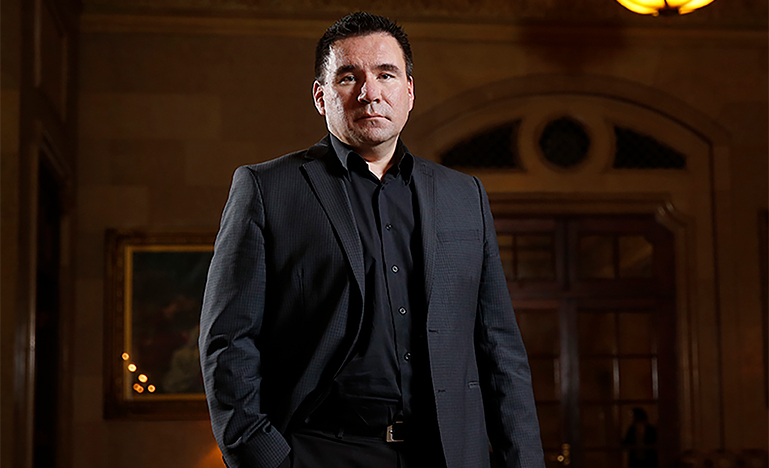Wiping the slate clean
The federal government will be forgiving loans to Indigenous groups who have taken on debt to negotiate comprehensive claims and treaties. But what does it mean for future negotiations?

Though there had been many discussions and promises made, it wasn’t until Indigenous leaders received invitations to the federal budget lockup that they knew it was finally happening: the government of Canada would forgive debts accrued, and reimburse payments already made against Negotiation Treaty Loans for comprehensive claims.
“Am I glad to see this being done? Yes, but there are so many more areas that need to be covered off,”
“It’s a great step forward for First Nations who have been negotiating for some time,” says Christopher Devlin. A principal at Devlin Gailus Watson, a Victoria-based firm with a focus on Aboriginal law, he is a past chair of the National Aboriginal Law Section of the CBA, and has represented many Indigenous groups in treaty rights negotiations.
“One of the problems with the comprehensive claims process,” he says, “has been the requirement to repay the loans, which are simply taken off whatever settlement fee is reached. But to capitalize on self-government and new jurisdiction of land and resources, that settlement fee is crucial. When the government takes back the negotiation loan, it really affects the amount of capital the First Nation has available to implement its treaty.”
Some of these treaty negotiations have been in process for 20 years, with the debt accruing to a point where, Devlin says, the Indigenous groups involved have to ask themselves if they can afford to settle the claim at all, given the size of the outstanding loan.
“The amount of jurisdiction that is recognized in a modern treaty requires an intensive investment of capital to create new infrastructure,” he adds. “And they just don’t find their monetary settlements to be sufficient.”
But despite the positive reaction to the budget announcement, he cautions against expecting it to trigger a sudden rash of treaty agreements.
“Eradicating the loan system has consistently been identified as a major piece of policy required to get these negotiations moving forward, but it’s not the only issue. First Nations still have to assess whether the mandates the government comes with are sufficiently broad and recognize their aspirations to a degree that’s acceptable to the First Nation. And every First Nation has to make that choice.”
And, according to Merle Alexander, hereditary chief of Kitasoo Xai’xais First Nation and Principal at Vancouver’s Miller Titerle and Company, those treaty mandates themselves are currently up in the air.
“There is a rebooting process around treaty mandates going on right now,” he explains. “Are comprehensive claims going to continue, or will they be abandoned? We don’t know.”
Nevertheless, he says the budget news has been widely welcomed by First Nations in B.C. and the Yukon, and by Indigenous peoples across Canada.
“Indigenous communities were the only members of this tripartite negotiation who were essentially paying to take part in the process,” he notes. “Now, among self-governing nations, there is real hope that without this massive debt, they will be able to achieve greater self-governance and become less economically dependent. And those currently in treaty negotiations are able to continue without feeling as though they are mortgaging their children’s future.
“Abolishing this loan system has been a consistent request from day one of its implementation in 1991,” he adds. “Everyone is very content with this result.”
What’s interesting from a legal point of view, he says, is how future negotiations are going to be financed, and how future governments will act.
“Ultimately this budget decision is a policy approach,” he explains. “It hasn’t been legislated. The debts are being forgiven by legal statute but the funding approach is about policy and, while it seems implicit that things will continue this way, I think there’s quite a bit of vulnerability around this approach being the future norm, especially if the government changes this fall.”
For Bradley Regehr, a partner with Maurice Law, Barristers & Solicitors and newly elected Vice-President of the CBA, the decision, while welcome, does not go far enough.
“Am I glad to see this being done? Yes, but there are so many more areas that need to be covered off,” he says. “So when I read the press release and I read the budget document, it appeared to be limited to comprehensive claim negotiations, but we have hundreds upon hundreds of different claims where there is loan funding, and then, when you finally settle the deal, the loan is considered part of the settlement.”
He notes that challenging breaches of the Indian Act or illegal land patents, for example, also are subject to loans eventually deducted from settlements.
“The Crown lends money and then wants its money back to negotiate something it did wrong— and this announcement doesn’t appear to cover that. And every time the Crown—provincial or federal—makes a decision that includes a duty to consult, First Nations have to hire legal counsel and other things, resource themselves to come to meetings, but these loans also don’t appear to be covered here.
“So I am happy to see that at least in the area of comprehensive claims that First Nations are getting their money back or their debts forgiven because they should never have incurred that debt in the first place. The obligation was on the Crown to settle with these groups. And then charge them? It makes no sense. That does not seem to me, to comply with the honour of the Crown.
“I am glad to see that they are finally doing something,” he adds. “But this is not an endpoint, it is just the beginning.”


